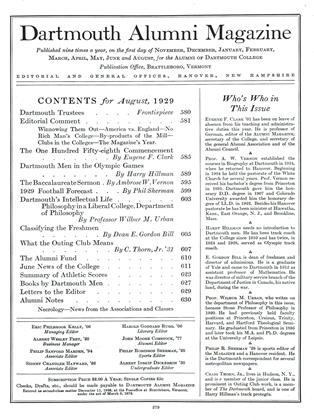Now to the games themselves. With about 4000 competitors representing more than 45 countries the world's play-week starts. With, each nation represented by its respective methods of cheering, the playing of the national air of the country whose athletes are returned victors, the Marathon race with its interest, the outside attractions and the closing ceremonies make for an attractive week, but perhaps there is nothing more inspiring than the opening day of the games, with the Stadium filled to capacity; the box of honor occupied by the heads and representatives of the country wherein the games are held; the parade of the competitors representing the nations of the world; the grouping of the standard bearers, with their national flags surrounding the chosen athlete of the country of the games, who with great solemnity raises his right hand, which is a signal to all the several thousand competitors grouped on the field to raise theirs, and subscribe to the spoken oath that they are true representatives of their countries, are amateurs in fact and spirit, and are competing in the games for sport's sake. And then the cannon's boom and thousands of homing pigeons are simultaneously freed, and with tremendous fluttering, rise from the ground, circling the Stadium, and then dart off , as it were, to the four corners of the earth, carrying with them messages of peace and goodwill. Then the parade of nations, four abreast, with a standard bearer leading each nation with its colors, passes the royal or official box, and then the games commence.
The most impressive incident in the writer's experience occurred the day of the Marathon race held in connection with the Athens Games in 1906, an event that will long be remembered. The great day, the day so impatiently waited for—the day of hopes, the day of agonies, the day of emotion and triumph has come at last. The great event to the Greeks was the Marathon race and excitement was at boiling point. The winner, should he happen to be a Greek, would be the idol of the country. Here are some of the prizes that were offered besides the regular olive wreath and cup: The Louvre, a large firm in Athens, donated a marble statue of Hermes. The baker, Nicolas Raptis, promised to furnish the winner with a loaf of bread daily for one year. The coffeehouse man, K. Krekmazis, offered him three cups of coffee daily for one year. The barber, Orphanidis, pledged himself to shave the winner gratis for the rest of his life. Mr. Karanikas, hotel keeper, said he would give a luncheon every Sunday for a year to the victor and to five of his friends, provided the victor was a Greek.
BROWN IN THE AIR
 View Full Issue
View Full Issue
More From This Issue
-
 Class Notes
Class NotesCLASS OF 1879
August 1929 By Henry Melville -
 Article
ArticleAlumni Council Meetings
August 1929 -
 Article
ArticleThe One Hundred Fifty-Eighth Commencement
August 1929 By Eugene F. Clark -
 Class Notes
Class NotesCLASS OF 1899
August 1929 By Warren C. Kendall -
 Class Notes
Class NotesCLASS OF 1903
August 1929 By John Crowell -
 Class Notes
Class NotesCLASS OF 1918
August 1929 By Frederick W. Cassebeer
Harry Hillman
-
 Sports
SportsHOW THE OLYMPICS BEGAN
AUGUST 1929 By Harry Hillman -
 Sports
SportsTHE UNITED STATES IN THE GAMES
AUGUST 1929 By Harry Hillman -
 Sports
SportsA THRILLING MARATHON
AUGUST 1929 By Harry Hillman -
 Sports
SportsDARTMOUTH IN THE OLYMPICS
AUGUST 1929 By Harry Hillman -
 Article
ArticleA New Hurdle
MARCH 1931 By Harry Hillman -
 Sports
SportsVARSITY TRACK
January 1942 By Harry Hillman








